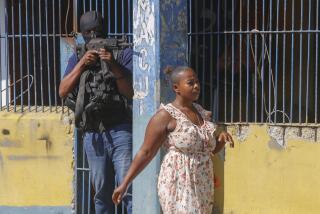China Speeds Up Process of Colony’s Hand-Over
- Share via
HONG KONG — Shipping magnate Tung Chee-hwa, named this week as the man who will lead Hong Kong after Britain hands it back to China, won’t start the job until the British governor sails away on June 30.
But Tung is not waiting quietly in the wings.
His first act as leader-in-waiting was to go to China the day after his appointment to prepare the formation of a shadow legislature that will operate even before the hand-over.
While Beijing leaders say this is necessary to prepare for the complicated transfer of power just half a year away, the move, in effect, creates a parallel power center that will compete with the Hong Kong government even before the Union Jack is struck.
It also creates a bizarre situation where some people will be serving both bodies simultaneously, even as they work at cross-purposes.
“Full cooperation with the Provisional Legislature is necessary,” Tung said this week, adding that he expected civil servants to work with the shadow body to help prepare for the hand-over.
Chris Patten, Hong Kong’s last British governor, while quick to congratulate Tung, pointedly reminded him that he was still the boss.
“We are both, of course, agreed that I am responsible for the administration of Hong Kong until June 30 next year,” Patten said, “and after that, he is responsible.”
But ever quick to divine the true source of power, some politicians and business leaders have been rushing to be part of the new regime. Not only are the governor’s days numbered, but also facing extinction is the legislature engendered by electorate-expanding reforms he introduced in 1992 without China’s approval.
Indeed, Beijing has branded Patten “a criminal” and the legislature “illegal,” and has said the lawmakers--and some of the laws they made protecting Hong Kong’s freedoms--will be thrown out when China takes over.
*
And so in the southern Chinese border town of Shenzhen, a 45-minute train ride from Hong Kong, Tung huddled on Thursday with an elite group of leaders from Hong Kong and China to discuss who they will install to replace the Legislative Council and undo its laws.
“The important thing,” Tung said at a news conference in a Shenzhen hotel room draped in red velvet as if it were the Great Hall of the People, “is to get 60 people with great credibility.”
The Provisional Legislature, as the replacement body is known, will be selected Dec. 21 by the same committee of 400 business people and politicians who chose Tung as chief executive on Wednesday. Many on the Selection Committee are also standing for the new legislature, which will serve for a year until proper elections are organized.
“It’s a farce,” said pro-democracy legislator Emily Lau, who pointed out that the Selection Committee, handpicked by China, would be in turn choosing people acceptable to China from its own ranks, which rules out any chance for dissenting views.
Most pro-democracy party members refused to apply for seats in the Provisional Legislature, making the current legislative session the last chance for those who were directly elected to push through controversial laws protecting dissidents and Hong Kong’s Bill of Rights.
But the selection process provides a second chance for 11 losers of last year’s elections. Elsie Tu, a feisty, white-haired activist who lost to popular Democrat Szeto Wah, denounced the 1995 race as “nonsense” after her defeat.
The list of 130 applicants for the seats includes election winners as well: 34 incumbent lawmakers, including Andrew Wong, the president of the Legislative Council, are vying for the 60 appointed places.
Since one of the main jobs of the Provisional Legislature is to amend or discard laws that China dislikes, its existence creates an Alice-in-Wonderland scenario: Those who want to serve both bodies--people like Wong--will be hurriedly making laws with the sitting legislature, while at the same time helping the shadow government plan how to undo them.
“I don’t see any conflict of interest at all,” said David Chu, a legislator and member of the Selection Committee who also wants a place on the Provisional Legislature. “The current legislature has no business making laws about issues after 1997. If there is overlapping, it is not the Provisional Legislature’s fault.”
But Margaret Ng, a fellow legislator and lawyer, is exploring legal challenges to block the Provisional Legislature’s formation.
*
Hong Kong’s post-1997 constitution mandates that the first council be directly elected. Calling the Provisional Legislature “illegitimate,” “undemocratic” and “incomprehensible,” she said it is most insidious because to outsiders, the structure of the government looks the same, even though it is being stripped of its internal power. “By having an appointed legislature,” she noted, “you remove the checks and balances of government.”
Though critics call it unpopular and perhaps illegal, they also say it might be inevitable.
“We can either have a revolution or accept it,” said legislator Frederick Fung, who nearly lost his seat on the Selection Committee for not agreeing with the notion of a Provisional Legislature. “But there’s not going to be a revolution.”
More to Read
Sign up for Essential California
The most important California stories and recommendations in your inbox every morning.
You may occasionally receive promotional content from the Los Angeles Times.













